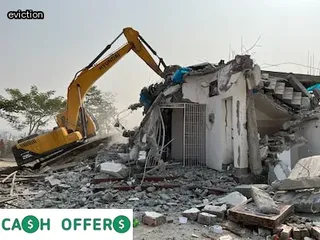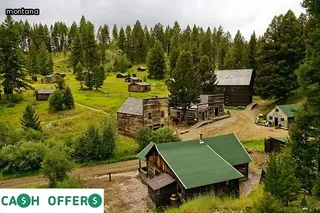Adverse possession, also known as squatter's rights, is a legal principle that allows a person to gain title to another person's real property if certain conditions are met and maintained for a specified period of time. In Montana, the law states that a person must be in actual possession of the land or property, open and notorious use of the land or property, hostile possession of the land or property, and continuous possession with the intent to claim ownership for a period of at least five years in order to acquire title under adverse possession.
Actual possession requires physical occupancy or use of the land or property while open and notorious use requires that the claimant's right must have been visible such that an owner could have seen it easily. Hostile possession means that there was no permission from the true owner given before taking occupancy.
The last requirement is continuous possession with intent to claim ownership which means that during this five-year period there can be no interruption in occupancy by either party. If all these requirements are met then title may be acquired but it should be noted that this may still not guarantee exclusive rights to the land or property.

When it comes to understanding squatter's rights in Montana, it is important to understand the concepts of hostile and actual possession. Hostile possession is when a person or group of people take over someone else’s property without permission from the rightful owner.
Actual possession occurs when a person takes possession of a property with permission from the rightful owner, such as through a lease agreement. In Montana, squatters may be able to gain legal ownership of a property if they have taken hostile or actual possession for an extended period of time without challenge from the rightful owner.
This is called “adverse possession” and it requires that the squatter occupy and use the property openly. It also includes paying taxes on the property and fulfilling other obligations as mandated by state law.
The length of time necessary to gain legal ownership varies depending on who holds title to the land and whether it is classified as public or private land. Additionally, certain requirements must be met before adverse possession can be claimed in order for it to be recognized by courts in Montana.
Homeowners and renters should understand their rights and responsibilities under these laws to ensure their interests are protected.
Establishing open and notorious possession in Montana is an important part of understanding a squatter's rights. Open and notorious possession essentially means that the squatter must be openly occupying the land or property with knowledge of other people.
This could include erecting a tent, living in an abandoned building, or even just parking a vehicle on the lot. It is also important to note that if the owner of the land or property is aware of the presence of squatters, they may have more rights than those who occupy without being seen by the landlord.
For renters in Montana, it is important to understand that their landlord may not necessarily have authority over them with respect to squatting rights, as squatters are protected under state law. It is also critical for homeowners to be aware of their own rights when it comes to dealing with squatters on their property; failure to do so can lead to legal trouble down the road.
Knowing how to establish open and notorious possession in Montana can help protect both landlords and tenants from having any legal issues related to squatters' rights.

In Montana, understanding the rights of squatters is vital for both homeowners and renters. Squatting occurs when someone unlawfully occupies a property without the consent of the owner, and exclusive possession rights are established when an individual has exclusive use of the premises for a specific period of time.
To establish exclusive possession rights in Montana, potential squatters must demonstrate that they have moved onto and made substantial improvements to the property, spent a significant amount of money on it or lived there for long enough to become possessors in good faith. Once these criteria are met, individuals may be able to claim exclusive possession rights to the property.
When this occurs, owners may not be able to remove them without going through legal proceedings, such as eviction proceedings or paying damages. It is important for homeowners and renters in Montana to understand their rights when it comes to squatting so that they can protect themselves from any potential issues.
In Montana, the rules for continuous possession requirements are fairly straightforward. For homeowners, they must show that they have been in continuous possession of their property for at least five years prior to being considered a squatter.
This means that the homeowner must be able to provide proof of ownership in the form of a deed or other official documentation. If a homeowner cannot provide this evidence, it is likely that they will not be considered a squatter and would need to vacate the premises.
As for renters, they must have lived on the property for at least six months before becoming eligible for squatters' rights in Montana. In addition, renters must also demonstrate that they have paid rent on time during their tenancy and can provide proof of residency in order to prove their right to occupy the property.
Overall, it is important for both homeowners and renters to understand what the continuous possession requirements are in Montana if they want to establish and protect their rights as squatters.

In Montana, the legal definition of a color of title claim is when an individual has taken possession of another person's real property in good faith and with reasonable belief they have some legal right to the land.
This may occur if the squatter has been in continuous possession of the property for at least five years, and can prove they believed they owned it or had a legal right to possess it.
In order to be successful with this kind of claim, there must also be a ‘colorable’ (that is, seeming to have some legal basis) source that supports their claim.
Color of title claims are particularly relevant for homeowners and renters in Montana, as it can help protect their rights over disputed properties.
In Montana, squatter's rights can be difficult for homeowners and renters to understand. It is important to learn about how squatter's rights are determined in the state, as it can affect both a homeowner’s and renter’s rights in terms of being able to stay in their home.
Squatter's rights refer to an individual who lives on another person’s property without permission or paying rent. Montana law states that if a person has lived on someone else’s land for five years or more, they have the right to remain living there until they are removed through legal action taken by the owner.
In order for squatters to gain these rights, they must use the property openly and continuously like a tenant would. This includes improvements made by the squatter, such as building structures or making repairs.
Additionally, squatters must pay all applicable taxes and fees associated with the property during their occupancy. Although these laws exist in Montana, homeowners and renters should always seek legal advice from a professional attorney when dealing with any situation involving squatters on their property.

It is important for homeowners and tenants in Montana to be aware of the potential for squatters. Squatting is defined as occupying a vacant property without permission from the owner, and squatters in Montana have certain rights that can make them difficult to remove.
To spot squatters in Montana, look out for signs of habitation such as furniture or appliances on the property, or evidence of people living there such as garbage, clothes, or other belongings. Be aware of any unusual activity around the property and ask neighbors if they have seen anyone living there recently.
If you suspect someone is squatting on your property, contact the police immediately and then consult with an experienced attorney who specializes in real estate law in order to understand your rights as a homeowner or tenant when it comes to dealing with squatters in Montana.
Under Montana law, determining who qualifies as a squatter can be a difficult process. Generally, a squatter is someone who moves into an abandoned or unoccupied property without permission from the owner, and then remains there for an extended period of time.
In order to qualify as a squatter in Montana, the individual must have been living on the property continuously and openly for at least six months prior to the dispute arising. During this period, the individual must also have made improvements to the property - such as adding locks or furniture - that support their right to possession of the land.
If these conditions are met, then it may be possible for the squatter to claim rights over the property or receive compensation for any improvements they've made. It's important for homeowners and renters in Montana to understand how squatters' rights work in order to protect their interests if they encounter a squatter situation on their land.

In Montana, it is important for both homeowners and renters to understand the state's laws regarding squatters. Squatters are people who establish a residence in an abandoned or derelict property without permission from the owner or tenant.
It is essential to be aware of how to protect your property from squats and how to evict them if they do take up residence in your home. The most effective way to protect a property is by making sure that all doors, windows, and other access points are locked at all times.
Additionally, installing security cameras and motion detectors can help deter squatters from entering the premises. If a squatter does enter the premises without permission, it is important to know that they have certain rights that could make it difficult to remove them.
For instance, if they have been living on the property for over six months, legally they may be considered tenants with certain rights under Montana law. Thus, it is important for homeowners and renters in Montana to familiarize themselves with the state's laws regarding squatters before any potential issues arise.
Adverse possession, also known as Squatter's Rights, is a law in Montana that allows an individual to gain legal title of a property they have occupied and improved for a certain period of time. In Montana, the timeframe required to gain ownership is seven years.
During this time, the squatter must occupy and improve the property in good faith and without permission from the true owner. The squatter must also pay all applicable taxes on the property and not cause any disruptions or disturbances to the area.
Once these requirements are met, the squatter may then file an action in court to obtain legal title to the property. It is important for both homeowners and renters in Montana to be aware of their rights under this law so they can protect themselves should they need to do so.

In Montana, squatters rights, or adverse possession, can be established after seven years of continuous and exclusive occupancy. Squatters rights allow a person to take ownership of a property that they are occupying without the permission of the legal owner.
This is often seen in cases where someone has been living on a property for an extended period of time, but does not have any legal documentation proving their occupancy. In such cases, the squatter may be able to claim the property as their own if they have resided there continuously and exclusively for at least seven years.
Homeowners and renters should be aware of this law as it could potentially have implications for them if someone who is not legally allowed to occupy their property establishes squatters rights. Knowing how long squatters rights must be established is key in understanding and protecting your legal right to ownership or rental of a property in Montana.
Adverse possession is a legal process in which an individual or group can gain title to another's real estate property based on the continuous, open and notorious use of the property for a certain period of time. In Montana, the shortest period of time that qualifies as adverse possession is five years.
This means that if someone has been using your property without your permission or knowledge for at least five years, they may be able to gain ownership rights over it. Homeowners and renters should understand their rights regarding adverse possession in case anyone attempts to claim ownership of their land without permission.
It is important to know the laws surrounding adverse possession in Montana so that you are aware of your rights and how to protect them.
No, Utah does not have any formal laws regarding squatters rights. Squatters rights are a form of property law that grants certain legal rights to individuals who occupy someone else's property without the consent of the owner.
While Utah does not have any specific laws related to squatters rights, other states such as Montana do. In Montana, homeowners and renters can gain an understanding of their state's squatters' rights by looking into the common law doctrine known as adverse possession.
Adverse possession is a legal concept that allows an individual to obtain title to another person's real estate if they live on it for a period of time, meet certain requirements, and pay taxes on the land. In Montana, this period of time is generally five years or more.
Additionally, the squatter must file a claim with the local government in order to prove their ownership of the property under adverse possession laws. Understanding one's state's squatters' rights is important for both homeowners and renters alike so they can protect their real estate investments and avoid potential disputes down the road.